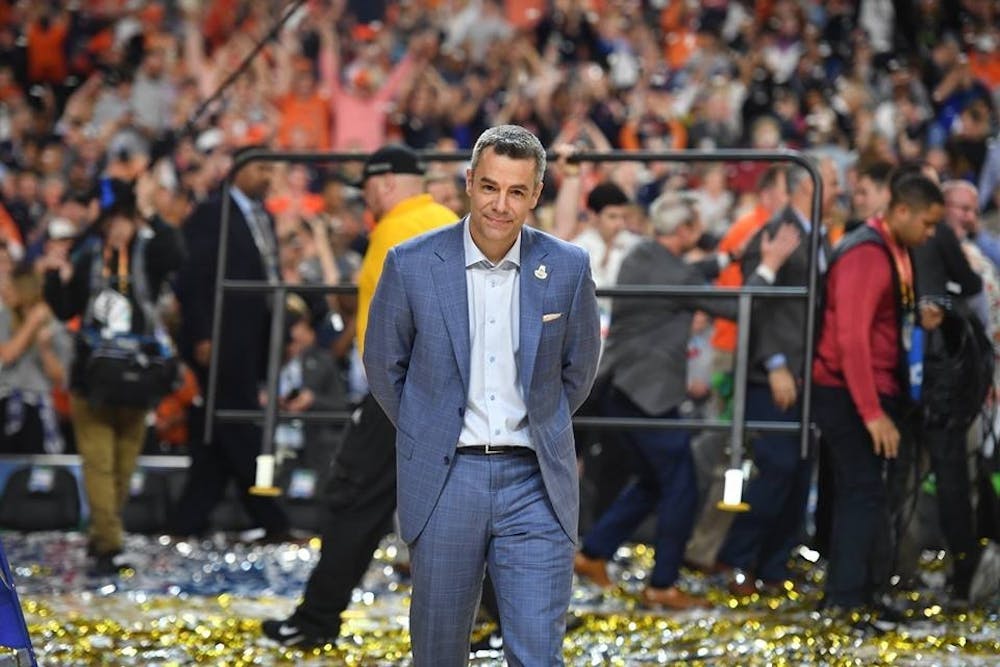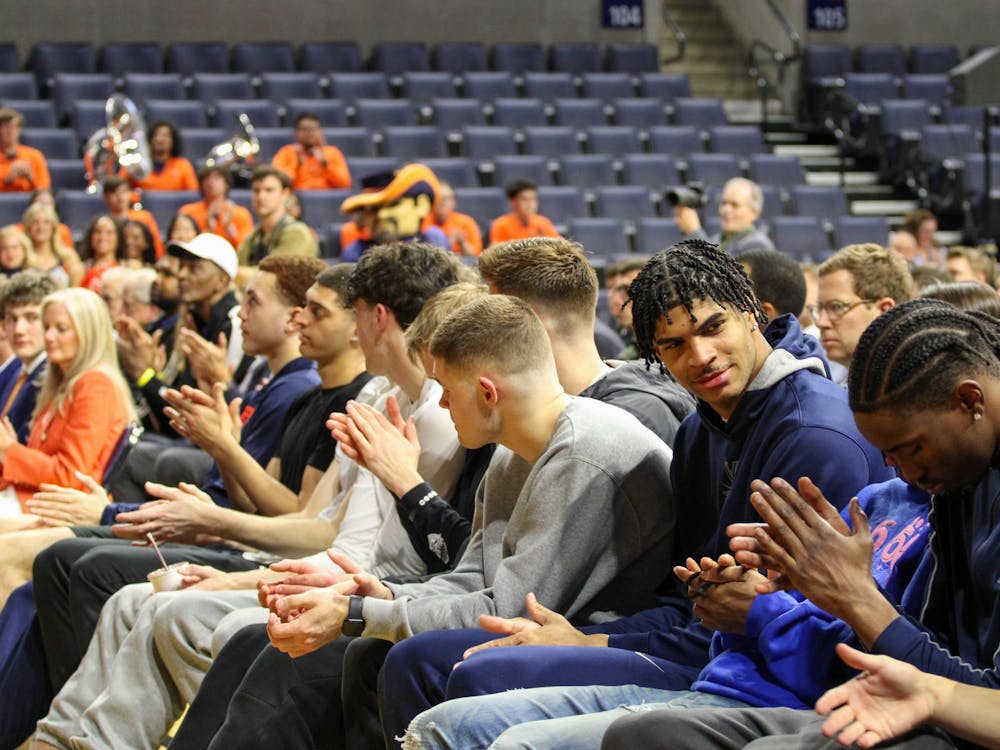The 2019-20 men’s basketball season was the most unpredictable, chaotic and, ultimately, shortest season that the sport has ever seen. However, despite the obstacles, this season proved to be Coach Tony Bennett’s most impressive performance at the helm of the Cavaliers.
It’s true that Bennett won a national championship in 2019 and that there have been numerous other seasons where Virginia had over 30 wins and ACC championships. Yet, there has never been a season where Coach Bennett’s sheer brilliance as a basketball coach willed a Virginia basketball team to overachieve as it did in 2020.
Virginia’s 2020 season was terrific for a number of reasons — the Cavaliers finished with an overall 23-7 record, including a 15-5 ACC record, and a No. 16 ranking in the final AP poll of the season. But, let’s not forget what this season was supposed to be.
This was supposed to be a rebuilding year for Virginia. The Cavaliers were supposed to struggle to survive in the ultra-competitive ACC, as conference rivals Duke, Louisville and Florida State boasted excessive amounts of talent on paper.
Former Virginia guards De’Andre Hunter, Kyle Guy and Ty Jerome as well as former center Jack Salt all left the program after helping Virginia win the national title in 2019 — that’s a combined 14 years of college basketball experience, including multiple championship wins. Hunter, Jerome and Guy collectively accounted for 44.2 of Virginia’s 76.1 points per game last year, or 58 percent of the entire Virginia offense. This level of talent and experience is difficult to replace or even replicate.
However, after losing so much from the previous year, the 2020 Cavaliers relied on Bennett’s coaching prowess to work. For Virginia to contend in the postseason again, players needed to be ingrained and incorporated into the system in a way that hasn’t been done in the Bennett era. It’s important to remember that the Cavaliers were led by forward Mamadi Diakite and guards Braxton Key and Kihei Clark this season — two seniors and a sophomore who were never primary options on the team previously.
Armed with a high basketball IQ and the ability to cultivate a culture of success, Bennett was able to help his team defy the odds and outperform expectations. Let’s take a deeper look at exactly how it happened.
Virginia’s defense was yet again dominant in 2020. The famous pack-line defense held opponents to just 52.4 points per game — the best in the entire country. Moreover, he did this with multiple new additions to the roster, including freshman guard Casey Morsell and junior guard Tomas Woldetensae.
If Bennett can lose four key defensive players — including Hunter, the 2019 ACC Defensive Player of the Year — and still maintain the top defense in college basketball, it’s clear that this was a special year.
While Bennett’s teams are known for their defensive prowess, he also took the Cavaliers’ less talked-about offense up a notch. In the primary rotation of Diakite, Key, Clark, Morsell, Woldetensae and junior forward Jay Huff, there was no primary shot creator or go-to scorer that a typical elite team has. Yet, creative offensive sets that catered to the strengths of its roster allowed Virginia to secure win after win.
Bennett is known for the year-to-year improvements his players make under his tutelage. This year was perhaps the most impressive example of his development skills as Diakite, Clark and Key all made incredible leaps this season and played far bigger roles than last year.
Diakite and Clark improved their scoring by 6.3 points per game each to 13.7 and 10.8, respectively, while Key’s scoring output increased by 4.2 points per game from the previous season to 9.9 points per game in 2020.
Bennett seamlessly integrated Woldetensae’s shooting ability into a system that featured more pick-and-roll, off-ball cuts and designed sets than ever before. Without playmakers, it was clear Bennett needed to put his players in the best position to score through some creativity. Bennett’s coaching not only helped cover weaknesses in the roster, but also allowed players like Diakite and Clark to become surprisingly potent offensive threats.
However, beyond his excellent gameplan, it was Bennett’s adjustments and leadership on the fly that made this season his most impressive campaign.
The saying “when it rains, it pours” is common in college basketball. Year after year, inexperienced teams are prone to suffering from negative momentum. Young squads often can’t get back on track once they’re behind. In these situations, coaching becomes paramount.
By mid-January, the season seemed to be slipping away from the Cavaliers. Virginia had lost three games in a row and was sinking to the bottom of the ACC standings. The Cavaliers — who had an 11-5 record at the time — had multiple issues ranging from a lack of outside shooting to inconsistent interior scoring.
At this point, just about every coach in the country would ride the season out and hope to regroup in 2021 as mid-season adjustments at the college level are nearly impossible to execute. Furthemore, most alternatives for Virginia would force an unproven, first-year player on the roster to take on more responsibility.
So, what did Virginia’s leader do? Adapt and survive.
Bennett featured Huff and Woldetensae more in an effort to stretch the floor. This created space for Diakite to work in the low post and for Clark to drive to the basket. The strategy provided Virginia some much-needed perimeter scoring, since Huff and Woldetensae can be threats from behind the three-point arc and gave Diakite more opportunities to score in the paint.
The result? A resurgent Virginia. Suddenly, the Cavaliers were one of the hottest teams in the country and a squad no team wanted to face. Amid desperate circumstances, Bennett’s coaching was the difference maker.
After a loss to NC state Jan. 20, Virginia would go on to win 11 of its next 12 games and eight in a row to close out the season. In the process, the Cavaliers beat then-No. 5 Florida State, then-No. 10 Louisville and then-No. 7 Duke as well as scored big wins over Notre Dame, North Carolina and in-state rival Virginia Tech.
The late-season turnaround certainly wasn’t bad for a team that seemed destined for the National Invitational Tournament. The Cavaliers wound up beating the preseason predictions and finishing in second place in the ACC. They were also likely on their way to a high seed in the 2020 NCAA Tournament.
We’ll never truly know how the 2020 Cavaliers would have fared in postseason play, as the global COVID-19 pandemic halted the season early. We can only look back on what this team did accomplish.
Virginia lost its greatest players from its greatest team without immediate replacements to fill the voids. On the cusp of collapse, Bennett completely changed his strategy midway through the season and allowed new players to rise and seasoned veterans to flourish in new roles.
While Bennett didn’t get to slap a Virginia sticker under the ‘Champions’ banner of the NCAA Tournament or hold up an ACC Championship trophy this year, he did something that may be even more difficult — revive a team that was free falling more than halfway through its season and lift it back into national relevance.
The 2019 national title may have been Bennett’s greatest achievement, but the 2020 season was his finest performance.







